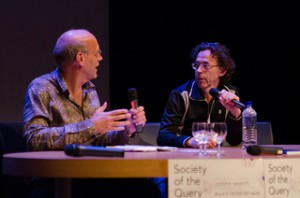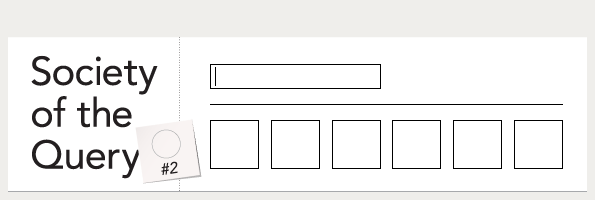Short interview with Maarten Sprenger from network cultures on Vimeo.

The fifth session of Society of the Query #2, ‘Search in Context‘ ended with a conversation between Geert Lovink and Maarten Sprenger, the author of a recently published book for children and adults about searching for valuable information online, who also has extensive experience in teaching about online search and who maintains a search engine especially for children. Please note that this is a revised and shortened version of the interview’s transcript, meant to highlight the most interesting points of Geert and Maarten’s conversation in a clear, concise and readable manner.
Geert Lovink (GL): Teaching the use of search engines in primary schools is quite advanced. Can you briefly sum up how you came up with this idea?
Maarten Sprenger (MS): For me it started with designing my own search engine, 8-12.info. Initially, it was a collection of links useful for primary school teachers, but then developed into a proper search engine meant to find relevant information for children. However, I discovered it wasn’t being used, and that teachers often told kids to “just Google it!” If the children then asked how to do so, the teachers would answer that they need to find proper keywords. That was the big problem: both children and teachers don’t know how to compose queries.
GL: Can you give us an example of your work in the classroom?
MS: My book, “Slim zoeken op internet” (“Smartly Searching the Internet”), is not only about search engines, but also about what Simon Knight, one of the previous speakers, addressed in his talk, namely information literacy. This book is about all things children should know regarding online search. For instance, kids need to build their individual vocabularies when faced with a search topic and investigate what they already know about that particular topic. Collaboration with fellow students on composing a query is essential. Children should first write down relevant words and ask questions to each other in order to come up with a meaningful query.
GL: I’ve read your book 2-3 times already and still find new things in it. Still, going back to the main question, how do you start teaching search engines to kids?
MS: It’s hard to really start teaching it, that’s why I wrote a book directly aimed at children. Schools don’t recognise it as a problem that needs to be dealt with. However, in my own art education classes, I try to include developing search skills. For instance, as part of my “Children of Amsterdam” project, which focuses on storytelling, kids had to find their own story and that’s when online search came into play.
GL: What struck me the most is how technical your book is. You seem to initiate kids in the use of a very technical language.
MS: Are you referring to search commands?
GL: Yes, you emphasise the importance of such commands, even if many of members of the audience don’t use them.
MS: You can best dig for information using those commands. Take the “site:” command: it’s a very powerful tool because you can search within the subpages of one specific website. The Web is far too big and, when it comes to information for children, you have to know which websites to query.
GL: Your website has more of the look and feel of a search portal rather than a engine.
MS: My website is both a portal and an engine, it does search all sites that are linked.
GL: But, if search currently plays such an important role in education, why do you think there are no specific search engines for kids?
MS: It’s because of a two-pronged issue of readability and reliability. An eight-year old child, for example, doesn’t need difficult texts, but readable information, tailored to his level of comprehension. Teachers must teach children to distinguish between reliable and non-reliable information, which is a key part of media literacy (or media wisdom, as we call it in the Netherlands), but here it’s just a small part of learning how to use computers as tools.
GL: Let’s focus on the rise of tablets. What do you think of this development?
MS: I think tablets and apps are great. They encourage exploration.
GL: Would you say it moves away from typing and clicking on links to taking shortcuts through much faster, almost subliminal activities? Do you think children know what they’re doing?
MS: When it comes to games and other apps, it’s hard for teachers to evaluate how useful they are. If tablets and their apps are to become a mainstay of education, then we have a problem. They can be good for teaching math, which is more easily verified, but it’s harder to assess other, more subjective types of learning. A balance must be found, one that combines using new devices with the interaction between teachers and students.
GL: Another problem and a significant issue of the Internet economy, which you also address, is free content. What is your stance on this matter?
MS: When your school is paying for – and depends on – accounts on various websites, such as language platforms, education becomes very fragmented. Information is being skipped; school libraries are being phased out and will be gone soon, unless a movement to prevent that begins. Children and schools with limited financial resources, however, won’t pay for access to online encyclopedias, especially when they believe that everything is freely available on the Web. While researching for my search engine, I found there is a lack of readable / reliable information for children on subjects such as geography, religion, sports and art.
GL: What is the next step? Teaching the teachers?
MS: I’m actually working on a new book, slightly different from “Slim zoeken op Internet”, on how to teach students.
GL: Is media literacy, as a part of the curriculum, on the rise at the moment?
MS: Yes, but it’s not nearly as widespread as it should be. For now, it’s up to individual teachers.
Society of the Query #2 – Interview with Maarten Sprenger from network cultures on Vimeo.


